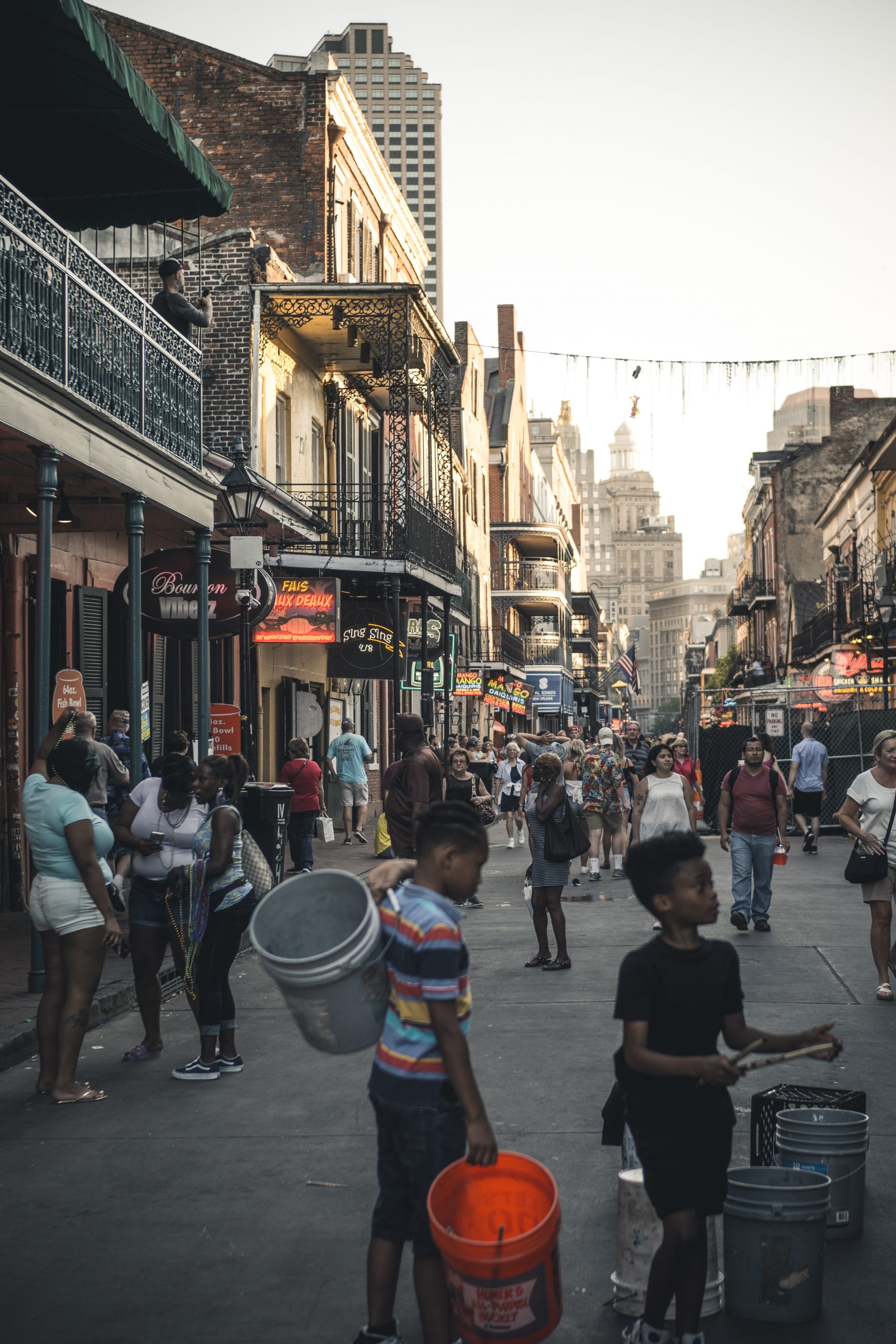In December, New Orleans, once known as the most incarcerated city in the most incarcerated state in the most incarcerated nation in the world, elected Susan Hutson, a woman many are calling the country’s first progressive sheriff. The day of her election, I watched the results trickle in with people who had made a seemingly impossible change a reality. Over the last few years, on-the-ground organizers managed to activate voters across the city resulting in the election of progressive judges and a progressive district attorney — and now the sheriff’s office was joining their ranks.
During the 2021 cycle, I served as the co-chair of PAC for Justice — a Louisiana state political action committee founded to elect reformers into the justice system in New Orleans while building an aligned base of organizers and activists. As part of the PAC’s campaign organizing, a group of grassroots organizers, jail experts, and formerly incarcerated leaders united in endorsing and supporting Hutson as the candidate best suited to continue the criminal justice reform movement that we set in motion in prior years — and to bring accountability to our jail and prison systems.
Our community of organizers marshalled all of our resources to knock on 40,000 doors, make 100,000 phone calls, send 80,000 texts and deliver over 5,000,000 impressions through digital ads. And that’s not including the efforts from our partner organizations like the American Civil Liberties Union, Working Families Party, Step Up for Action, and Voters Organized to Educate.
In electing Susan Hutson, we elected the first Black woman in Louisiana state history to hold the office of sheriff. This matters for deeply symbolic and historical reasons, but also for real-world reasons that can make a meaningful difference for all New Orleanians. This shift didn’t begin with Hutson, nor will it end with her. But her election does reflect a groundswell, many years in the making, to make our city and its people healthier and more free.
First, the symbolism. The sheriff’s office is critical in our quest to dismantle the system that has terrorized our communities for generations. Across the country, sheriffs have historically been a symbol of oppression, dating back to the slave patrols in the 1700s through their influence in the days of Jim Crow. The legacy of sheriffs includes playing a role in upholding white supremacy in the criminal legal system — by, among other things, holding the keys to jails and working with federal authorities to break apart immigrant families. Things aren’t much different today: Nationally, 90% of sheriffs are white men. Like the rest of law enforcement, they have long had ties to white supremacist groups and far-right militias — some of them even joined the insurrection at the Capitol.
Of course, other troubling realities can be attributed to sheriffs. More than 1,000 people die in county jails each year, and many of those deaths are preventable with proper medical and mental health care. They also serve as the bridge to mass deportations: Since 2006, sheriffs have played a role in the deportation of hundreds of thousands of people. Sheriff’s deputies, meanwhile, like others in law enforcement, are known to kill people they come in contact with. How sheriffs maintain their jails has an impact on public health. And sheriffs can also be instrumental in protecting the voting rights of people in their keep.
Because the sheriff in town is at the center of so many issues that affect the future and wellbeing of our communities, we made electing Hutson the next target in our campaign to transform New Orleans from the incarceration capital of the world into an epicenter of criminal justice reform. Our work has been years in the making, but we weren’t the first ones to try something like this. The civil rights movement successfully targeted lawmen like Bull Connor in Birmingham, Alabama, and won local campaigns. But their ultimate goal was to dismantle Jim Crow entirely. Similarly, our short-term goal was to defeat the incumbent Sheriff Marlin Gusman; the significance of ending his deadly tenure cannot be overstated enough.
But our ultimate goal is to end the conditions that made New Orleans the epicenter of mass incarceration in the nation. To understand this long-term goal, and how Hutson fits into it, it’s instructive to review how far we’ve come in pushing the local sheriff to listen to our communities’ demands.
The organization for which I am the executive director, Orleans Parish Prison Reform Coalition, was founded in 2004 by a coalition of local individuals and organizations coming together to demand transparency, oversight, and accountability at the Orleans Parish Prison, now known as the Orleans Justice Center. In their work with immigrants held there through the newly formed Immigration and Customs Enforcement detention facility, organizers were alerted to the horrendous conditions and treatment inside the jail. We mobilized to alert the community to the horrors inside the jail and later created a Nine-Point Platform that sheriff candidates signed onto in the race to topple then-30-year incumbent Sheriff Charles Foti.
Under Foti, New Orleans led the nation in its per-capita incarceration rate. When Foti was elected in 1974, there were 800 people locked up in Orleans Parish Prison, with New Orleans’ population being 569,000 people. At the end of Foti’s tenure in 2004, OPP detained nearly 6,500 people — including children, people being held under the Department of Corrections, and people with ICE holds — while the population of New Orleans had actually declined to 485,000. In other words, as mass incarceration took a hold of our city, Foti was an active participant in overseeing the expansion of the jail system’s reach and fostering the inhumane and unconstitutional conditions of confinement that came to define it.
Signaling a break from the Foti reign, then-candidate Gusman signed onto our Nine-Point Platform that demanded full compliance with all federal consent decrees, an end to unlawful detention, proper and confidential access to legal counsel, and more. But Gusman quickly revealed his disregard for the humanity of those he was charged to care for when he abandoned thousands of our friends and family members during Hurricane Katrina. Despite this record, Gusman kept getting reelected and sometimes ran unopposed. That means that for 17 years, Marlin Gusman presided over the Orleans Justice Center, known to be one of the deadliest jails in the nation.
Because of this track record of human misery, it became clear to us that the last thing New Orleans needed was a bigger jail. So in recent years, our organization and our partners across the region have been in a battle to stop the completion of the proposed Phase III psychiatric jail. Instead of a bigger complex for Gusman to manage, we wanted to allocate resources to community-based mental health services because those facing severe crises need care. They do not deserve handcuffs. Phase III was Gusman’s latest attempt to grow the jail, even after years of criticism from federal monitors appointed to oversee his work.
As one of the cornerstones of her 2021 campaign, Hutson opposed the construction of the psychiatric jail and advocated for a retrofit of the current facility. The retrofit would not increase the jail’s size. Instead, it would bring the facility into constitutional standards while allowing city funds to be used for non-carceral care for people with mental illnesses. While the mayor, city council, and most recently the city planning commission have voiced their support for the alternative retrofit plan, we still face an uphill climb to prevent jail expansion in New Orleans, even with Hutson’s win. Our work here is not done.
Hutson also campaigned on several points centered around recidivism and harm reduction that mirrored the tenets of my organization’s 2021 Sheriff Platform, which was developed by our community and endorsed by more than 30 local community organizations. Hutson has committed to ending the practice of charging family members for jail phone calls and ensuring gender-confirming housing for our trans, gender-nonconforming, and non-binary community members within the jail. These principles are essential for safety, mental health support, family unity, economic stability, and more. As Hutson has promised, approaching jail operations more humanely helps make our community safer inside and outside of jail walls.
We harbor no illusions that electing a jailer will end the harms of incarceration, but a win at the sheriff’s level will help keep those incarcerated safe and, hopefully, result in a key ally to help us push against further expansion of the jail. We know that if the city moves forward with building a bigger jail, they will fill it. So we must stop the building of bigger jails while continuing to push for community solutions that address the root causes of incarceration, such as poverty, lack of mental health care, and desperation. What we need most are systems that prevent folks from being pushed behind bars in the first place.
To this end, last year our organization launched our Help Not Handcuffs campaign. We met with community members all across the city and discussed their needs and how we could prevent folks experiencing mental health crises from interacting with police in the first place. As a result of our campaign, the New Orleans City Council created a committee to study how we could create a non-police mental health care response unit. While I am hopeful and excited to be a co-chair of that committee, we can’t just study the issue, which is already a reality in other localities. Over 80% of people incarcerated in Louisiana have been identified as having a psychiatric or substance abuse disorders. We need action, and Hutson could use her influence as sheriff to make it clear that New Orleanians deserve non-carceral, community-based mental health services. Jails are not hospitals, and consensual care is key. Furthermore, Hutson’s continued opposition to building a Phase III psychiatric jail would allow our city to use resources on proactive measures instead of caging neighbors with mental illnesses.
Ultimately, this is a harm reduction strategy. Working alongside us and other system actors who understand what’s at stake, Hutson can use her platform to push back on the regressive, harmful practices that have kept our community incarcerated. In this regard, Hutson’s win will save lives, but only if the organizers who propelled her to victory keep their foot on the gas and continue to demand services that keep our communities safe, among them living wages, affordable housing, and mental healthcare.
Yes, we know this is just one election. And as the Gusman years showed, there’s no doubt that some will question that a city jailer can be trusted with systemic, decarceral change. But we hope that, in electing Hutson, we put other sheriffs across the nation on notice — by calling attention to their tremendous, unchecked, and too-often-lethal power. And by showing that it is possible to create the conditions and mobilize voters to move past the carceral politics that long defined New Orleans. No one candidate can break the longstanding legacy of the sheriff’s office, let alone its role in perpetuating mass incarceration. But we, the people, can reimagine what that office means and push it to support our broader goal of creating safer, healthier communities. So while we celebrate, we cannot forget that we have many wins to go.
Image: NICO BHLR/Unsplash

